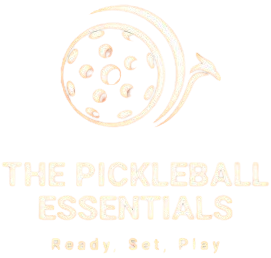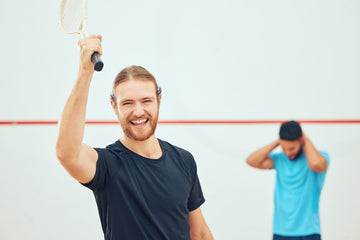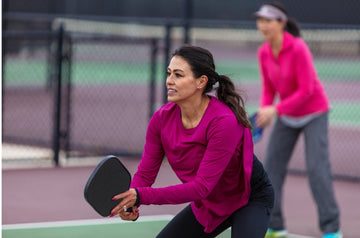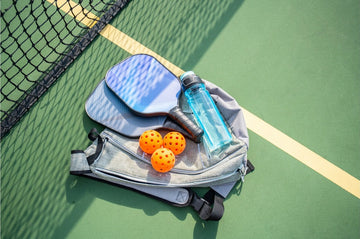The Importance of Hydration in Pickleball: A Comprehensive Guide
by Linda Conrad on Aug 27, 2024
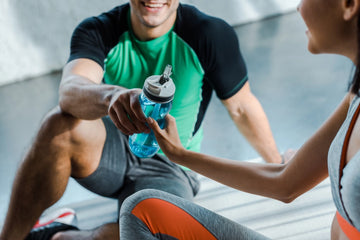
Introduction
Staying hydrated is crucial for anyone engaging in physical activity, and pickleball is no exception. Proper hydration is key to maintaining optimal performance, preventing heat-related illnesses, and ensuring overall health. Whether you’re a seasoned player or new to the game, understanding the role of hydration can help you enjoy pickleball safely and effectively. This article will delve into why hydration is vital, signs of dehydration, how to stay hydrated, and the best hydration practices tailored specifically for pickleball players.
Why Hydration is Essential in Pickleball
- Maintaining Physical Performance:
- Water is essential for regulating body temperature, lubricating joints, and transporting nutrients. During a game of pickleball, especially in hot weather, the body loses water through sweat. Even mild dehydration can lead to a decrease in physical performance, affecting reaction times, endurance, and coordination.
- Statistics: Studies show that losing just 2% of body weight through sweat can significantly impair physical performance. This is critical in pickleball, where agility and quick reflexes are key.
- Preventing Heat-Related Illnesses:
- Pickleball is often played outdoors, exposing players to high temperatures and sun. Without adequate hydration, players are at risk of heat exhaustion or heat stroke, which can be life-threatening.
- Warning Signs: Symptoms of heat-related illnesses include dizziness, nausea, rapid heartbeat, confusion, and fainting. Recognizing these symptoms early and taking immediate action by hydrating and cooling down can prevent serious health issues.
- Supporting Mental Focus and Decision-Making:
- Dehydration affects cognitive functions, including concentration, alertness, and decision-making. In a fast-paced game like pickleball, mental clarity is essential to making quick and strategic decisions. Proper hydration helps maintain mental sharpness and focus, contributing to better gameplay.
Signs of Dehydration
- Physical Signs:
- Thirst: Feeling thirsty is the body's initial signal for dehydration. However, relying solely on thirst as an indicator can be misleading, as it often kicks in when you are already mildly dehydrated.
- Dry Mouth and Skin: Dehydration reduces saliva production, leading to a dry mouth. Similarly, skin may appear less elastic and dry.
- Fatigue and Weakness: Without sufficient water, the body's ability to transport oxygen and nutrients to muscles is compromised, leading to fatigue and a sense of weakness.
- Dark Urine: A clear indicator of dehydration is dark-colored urine. The darker the urine, the more concentrated it is, indicating the need for more water.
- Performance-Related Signs:
- Reduced Endurance: Dehydrated muscles do not perform efficiently, leading to early fatigue and reduced endurance during play.
- Cramps and Muscle Spasms: Lack of water and electrolytes can cause painful cramps and muscle spasms, common during prolonged pickleball sessions.
- Dizziness and Lightheadedness: Insufficient hydration can cause a drop in blood pressure, resulting in dizziness, lightheadedness, or even fainting during or after intense physical activity.
How to Stay Hydrated While Playing Pickleball
- Pre-Game Hydration:
- Begin hydrating well before the game starts. Drink at least 16-20 ounces of water 2-3 hours before playing. Follow this with another 8-10 ounces 20-30 minutes before stepping onto the court. This ensures your body starts the game fully hydrated.
- Tip: Avoid caffeinated or alcoholic beverages before playing, as they can lead to increased urine output and dehydration.
- During-Game Hydration:
- Drink water regularly during the game, ideally every 15-20 minutes. Aim for about 4-8 ounces of water each time you take a break. If playing for more than an hour, consider a sports drink that contains electrolytes to replace lost salts and minerals.
- Tip: Keep a water bottle at the side of the court and take small sips frequently rather than waiting until you feel thirsty.
- Post-Game Hydration:
- After playing, rehydrate to replace any fluid loss. A good rule of thumb is to drink 16-24 ounces of water for every pound lost during the game. Weighing yourself before and after the game can give you an idea of how much fluid to replace.
- Tip: Include drinks with electrolytes if you’ve been sweating heavily. Electrolyte drinks help replenish sodium, potassium, and other minerals lost through sweat.
- Hydrating Foods:
- Incorporate hydrating foods into your diet, such as watermelon, cucumbers, oranges, and strawberries. These foods have high water content and provide additional nutrients that support hydration.
- Tip: Snack on hydrating foods before and after play to boost your water intake naturally.
Best Practices for Hydration in Pickleball
- Monitor Your Urine Color:
- Use the color of your urine as a quick hydration check. Aim for a light, pale yellow color, which indicates adequate hydration. Dark yellow or amber-colored urine is a sign that you need to drink more water.
- Adjust Hydration Based on Weather Conditions:
- In hot and humid conditions, the body sweats more, increasing the need for hydration. In cooler weather, you might not feel as thirsty, but you still lose water through sweat and breathing. Adjust your fluid intake based on the weather to ensure you stay hydrated.
- Use Electrolyte Supplements:
- During prolonged play or in extreme heat, consider using electrolyte supplements or sports drinks. These help maintain the balance of sodium, potassium, and magnesium, which are crucial for muscle function and preventing cramps.
- Tip: Choose low-sugar options to avoid unnecessary calorie intake and ensure a balanced electrolyte replenishment.
- Listen to Your Body:
- Pay attention to early signs of dehydration such as thirst, dry mouth, or feeling overheated. Take breaks to drink water and cool down. Never ignore the body's signals, as early intervention can prevent serious dehydration.
- Educate Yourself and Others:
- Understanding the importance of hydration can help prevent injuries and illnesses. Share knowledge with fellow players, especially beginners, about the importance of staying hydrated and the best practices to follow.
Conclusion
Hydration is a critical component of playing pickleball safely and effectively. By staying hydrated, you can maintain optimal physical performance, prevent heat-related illnesses, and support your overall health. Remember, proper hydration starts before you even step onto the court and continues throughout and after your play. Make hydration a priority, listen to your body, and enjoy your time on the court to the fullest.
